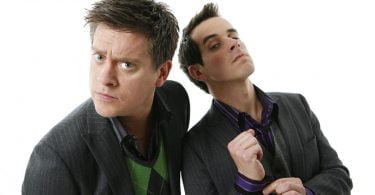In the latest trailer for World War Z, there’s an awful lot of Brad Pitt.
In the latest trailer for World War Z, there’s an awful lot of Brad Pitt. Brad Pitt looking determined as he goes to do things to save humanity, Brad Pitt looking sad as he leaves his family, Brad Pitt looking doleful as he sees the damage zombies are doing to his precious civilisation. Essentially, the film trailers want to make it clear, this is a Brad Pitt film.
This is natural—Brad Pitt just so happens to be one of the producers for this as well as its star, and a star of his billing will naturally feature front-and-centre of any advertising campaign. However, for fans of the book such as myself, it provokes a distinct sense of unease. Frankly, I worry that this movie is going to be terrible. Why? Because, from what we have seen from the trailers, it is a total betrayal of everything that makes the Max Brooks book such a devastatingly effective piece of satirical horror.
Let us for example look at the plot. According to internet bible Wikipedia: “United Nations employee [Brad Pitt] travels the world trying to find a way to stop the zombie pandemic that is defeating armies and collapsing governments.”
Now, obviously, I understand the reason for this. The book’s narrative, told as a retrospective series of interviews with survivors of the zombie war, would not work well as a cohesive singular narrative. But why make your movie a singular narrative? With a story that focuses on such global implications, this is almost the perfect plot for a series of shorter films held together by the central theme. It would have given us a chance to see zombies from the viewpoints of those being interviewed instead of every encounter being reeled through the eyes of Brad bloody Pitt.
There’s a particular scene in the book, for example, where a young Palestinian boy at first refuses to believe that the zombie outbreak is real, considering it a hoax perpetrated by Israel. It’s a clever example of the fractured relationship between the two. How are they going to have that with Brad Pitt unless he spends the first twenty minutes of the movie wearing a “Free Palestine” shirt?
Also, how are you going to have the snippets of information from the totalitarian territories that Brad Pitt would be unlikely to enter on account of him being as American as sin? There’s a lot of shifting political ideologies throughout the novel—China achieves the democracy that Guns and Roses wrote so eloquently about, Russia becomes a theocratic dictatorship that cultivates an abhorrent breeding program and North Korea’s people vanish into caves, the remaining pockets of civilisation unwilling to release them in case they’re infected—that are essential to the original novel’s satire.
The timing of the film in comparison to the novel is important too. The film of course purports to show the events as they happen. Again, I understand why, but I still object to this. The trailers have shown the film to be a big shooting gallery of zombies, undercutting the whole horror aspect that works so well with zombies done right.
The book laid out the scenario from the outset—the world is totally screwed, how did it happen—and so every scene that the book lays out for you leaves you unnerved, wondering when exactly everything is going to go wrong.
Take for example the decimation of the American Army in the Battle of Yonkers. In the book you knew it was going to be horrific because you knew they had already lost. Yet to see each detail played out in agonising detail was as grim as any other zombie interpretation you may care to mention.
This ties in to the central problem of having a main character in what is essentially an ensemble piece. Look, I like Brad Pitt. I like the fact that his career is completely unpredictable. He can go from utter dross to utter brilliance in the space of one year, and he completely owned Fight Club, one of my favourite films (because I’m a boringly predictable hipster). But with Brad Pitt comes a certain lack of danger, a certain knowledge that his character will, in all probability, survive. That undermines horror to an ironically terrifying degree.
Sure, his family might die. Then what? There’ll be an orchestrated crescendo as Brad Pitt opens his arms and screams to the sky, “WHYYYYYYYYYYY?! WHY THEM?!” and everyone will be a little sad. Unfortunately, in horror, and in particular the slow, cloying horror that Max Brooks was peddling us, it’ll just come across as quite silly and bombastic.
The book worked because everything was in a microcosm, each story connected by this outbreak yet solely individual. You cared about each person’s trials and tribulations, the losses they all faced. It helped give the book that feeling of globalised chaos that Brad Pitt’s gurning face cannot equal.
I think that’s the central problem. The book was so globalised in its content that it had a weight and depth to its material, an ability to genuinely use the zombies to mirror our own society. A lot of the horror of the novel was not the zombies themselves, but us, how we reacted, how we fled, how we sacrificed thousands to save hundreds and how we died. Brad Pitt looking wistfully out of a helicopter window is a poor substitute.
There’s one other gripe that I have to air, and this is petty, I warn you, but the zombies in the film trailer are fast. The zombies in the books are slow. This may seem like nothing to you, and to your credit, you’re probably right, but it’s important in establishing what sort of horror a zombie film is going for.
The slow zombies of old Romero, Shaun of the Dead and the World War Z novel work because their speed is deceptive. It doesn’t matter how fast they go, because they are relentless. Fast zombies however are, well, a bit crap. Occasionally they work. 28 Days Later, for example, worked because this idea of super-fast zombies was completely new, and basically tore up our expectations of what a zombie was supposed to be (although technically, they weren’t zombies but people infected with a “rage” virus. Yes, I am that pedantic).
So you could say I’m pensive about the film adaption. You’d be right. I’m willing to be convinced, however. As I said, I do like Brad Pitt. He’s done some great films over the years. Also, World War Z is some incredibly strong source material, so any adaptation of it should be able to have some of that magic rubbed off on it. Yet I’m still uneasy. World War Z’s main strength was its ability to savage us as a civil society as much as meatbags for ravenous zombies.
If the movie cannot supply the satirical edge that made the novel so great, it has failed.
What do you think? Are you looking forward to seeing World War Z? Have your say in the comments section below, on Facebook or on Twitter.








